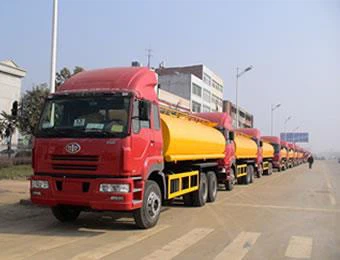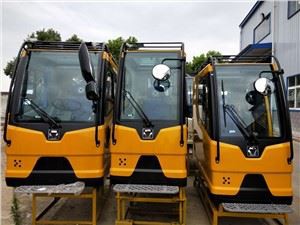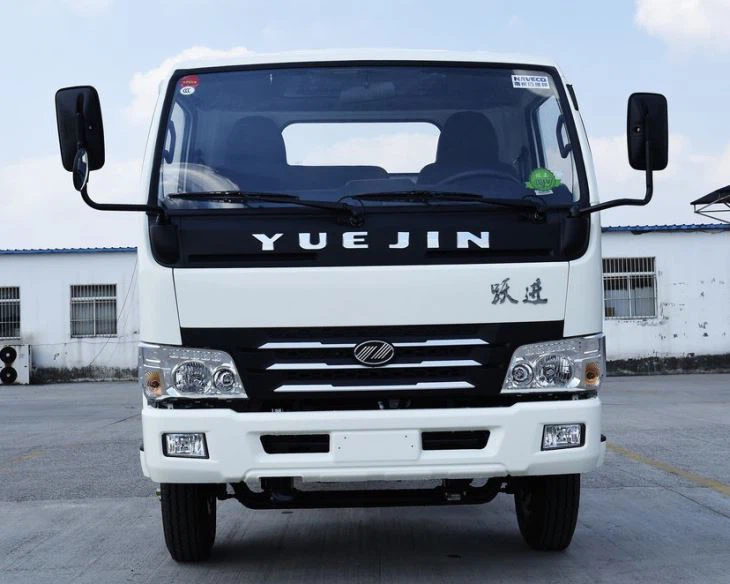Understanding Diesel Tank Trucks: A Comprehensive Guide

Diesel tank trucks are essential vehicles in the transportation industry, playing a crucial role in delivering fuel to various destinations. This article explores the intricacies of diesel tank trucks, their types, components, regulations, and much more.
What is a Diesel Tank Truck?
A diesel tank truck, commonly referred to as a fuel truck or tank truck, is a specialized vehicle designed to transport diesel fuel from one location to another. These trucks have large storage tanks that securely hold fuel during transportation. They play a vital role in supplying diesel to gas stations, construction sites, farms, and other industries that rely on this energy source.
Key Features of Diesel Tank Trucks
- Tank Capacity: Diesel tank trucks come in various sizes, with capacities ranging from 1,000 to over 10,000 gallons.
- Material: Tanks are typically made from high-quality steel or aluminum, ensuring durability and resistance to corrosion.
- Pumping System: Equipped with pumps and hoses, these trucks can efficiently load and unload fuel as needed.
- Safety Features: Many tank trucks come with safety features such as overfill prevention systems and emergency shut-off valves.
Types of Diesel Tank Trucks
Understanding the different types of diesel tank trucks is essential for businesses needing specific transportation solutions.
1. Standard Diesel Tank Trucks
Standard diesel tank trucks are the most common type used for transporting diesel fuel. They are versatile and can carry large quantities of fuel over long distances.
2. Fuel Delivery Trucks
Designed specifically for delivering fuel to retail locations, these trucks often have multiple compartments to carry various types of fuel, including gasoline, ethanol, and diesel.
3. Tanker Trailers
Tanker trailers are attached to a tractor truck and can transport larger volumes of diesel fuel. They often have a higher capacity and are ideal for bulk fuel delivery.
4. Mini Fuel Tank Trucks
Mini fuel tank trucks are smaller in size and designed for local deliveries. They’re commonly used in urban areas where maneuverability is crucial.
Components of a Diesel Tank Truck
Understanding the components of a diesel tank truck helps in maintenance and operation. Here are the essential parts:
1. Fuel Tank
The primary component, the fuel tank, is where diesel fuel is stored. It is designed to withstand high pressure and corrosion.
2. Pumps
Pumps are crucial for loading and unloading the fuel. They ensure fuel is dispensed at the right pressure and flow rate.
3. Hoses and Nozzles
Flexible hoses and nozzles are used for dispensing fuel from the tank to the destination, ensuring safety and efficiency in the process.
4. Valves and Gauges
Valves control the flow of fuel, while gauges monitor the tank’s fuel level, ensuring operators know how much fuel they have at all times.
5. Safety Systems
Modern diesel tank trucks are equipped with safety systems, including spill containment measures and fire suppression mechanisms, to protect against accidents.
Regulations and Compliance for Diesel Tank Trucks
Diesel tank trucks must comply with various federal, state, and local regulations to ensure safety during transportation.
1. Department of Transportation (DOT) Regulations
The DOT sets regulations regarding the operation of tank trucks, including equipment standards, driver training, and vehicle inspections.
2. Environmental Protection Agency (EPA) Guidelines
The EPA has guidelines to prevent fuel spills and ensure that tank trucks do not harm the environment during transportation.
3. State-Specific Regulations
Each state may have additional regulations that must be followed, including permits required for transporting hazardous materials.
Best Practices for Operating Diesel Tank Trucks
Safe and efficient operation of diesel tank trucks is essential for drivers and companies alike.
1. Regular Maintenance
Conducting routine inspections and maintenance on the truck and equipment is crucial for safety and efficiency. This includes checking the fuel tank, pump, and safety systems.
2. Proper Loading Techniques
Ensure the tank is filled appropriately and evenly to avoid shifting loads during transportation. Following loading guidelines reduces the risk of accidents.
3. Driver Training
Providing comprehensive training for drivers on handling tank trucks and spills is vital for minimizing risks associated with transporting diesel fuel.
4. Emergency Response Plans
Establishing and regularly updating an emergency response plan helps prepare drivers for potential spills or accidents, ensuring swift action is taken.
Practical Examples and Case Studies
Examining real-world scenarios can provide insights into the operational aspects of diesel tank trucks.
Case Study: Fuel Delivery to Construction Sites
A construction company regularly employs a fuel delivery truck to supply diesel fuel to machinery on-site. By scheduling regular deliveries, the company reduces downtime and ensures projects remain on schedule.
Example: Local Delivery with Mini Fuel Tank Trucks

A small business uses mini fuel tank trucks for local deliveries. These smaller trucks allow them to navigate urban traffic and deliver fuel promptly to their clients without the need for larger vehicles.
Future Trends in Diesel Tank Truck Industry
As technology advances, the diesel tank truck industry also evolves. Here are some emerging trends.
1. Alternative Fuels
As more companies focus on sustainability, there is a growing interest in alternative fuels that can be transported using tank trucks, including biofuels and renewable diesel.
2. Automation and Technology
Advancements in technology are paving the way for automated driving systems and improved logistics management, leading to greater efficiency in fuel transportation.
3. Enhanced Safety Systems
Continual improvements in safety features, such as collision avoidance systems and real-time monitoring, will enhance the safety of fuel transport operations.
Tips for Choosing the Right Diesel Tank Truck
Selecting the appropriate diesel tank truck depends on various factors specific to your business needs.
1. Assess Your Fuel Requirements

Evaluate how much fuel you need to transport regularly to determine the appropriate tank size.
2. Consider Your Delivery Locations
Identify the type of roads and locations you will be delivering to, which may require specific truck sizes and features.
3. Budget and Costs
Analyze your budget for purchasing or leasing a tank truck, as well as ongoing maintenance and operational costs.
FAQ Section

1. What is the average lifespan of a diesel tank truck?
The average lifespan of a diesel tank truck is typically around 15-20 years, depending on maintenance and usage.
2. Are diesel tank trucks suitable for transporting other fuels?
Yes, many diesel tank trucks can be designed or modified to transport other fuels like gasoline or biodiesel, depending on regulatory compliance.
3. What safety features should I look for in a diesel tank truck?
Look for safety features such as emergency shut-off systems, spill containment systems, and updated fire suppression mechanisms.
4. How do I ensure compliance with regulations?
Regular training for drivers, routine inspections, and staying informed about changing regulations can help ensure compliance.
5. What maintenance is required for diesel tank trucks?
Routine checks and maintenance should include inspections of hoses, pumps, safety systems, and ensuring the integrity of the tank.
6. How can technology improve diesel tank trucking operations?
Technology can enhance logistics management, improve safety through advanced systems, and potentially lead to automation in fuel delivery.
